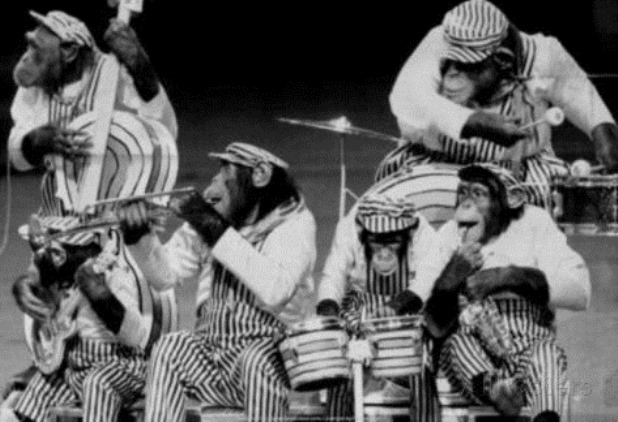Daily Stormer
September 19, 2014

If chimpanzees could make music, they would be making music with the same rhythms as those found in Africa and India.
When Black music was played at the chimps enclosure, they would deliberately spend time in that area, while when White man’s music was being played, they avoided the area completely.
Whether or not they started twerking to their Negro brother’s rhythms has yet to be disclosed.
APA:
While preferring silence to music from the West, chimpanzees apparently like to listen to the different rhythms of music from Africa and India, according to new research published by the American Psychological Association.
“Our objective was not to find a preference for different cultures’ music. We used cultural music from Africa, India and Japan to pinpoint specific acoustic properties,” said study co-author Frans de Waal, PhD, of Emory University. “Past research has focused only on Western music and has not addressed the very different acoustic features of non-Western music. While nonhuman primates have previously indicated a preference among music choices, they have consistently chosen silence over the types of music previously tested.”

Previous research has found that some nonhuman primates prefer slower tempos, but the current findings may be the first to show that they display a preference for particular rhythmic patterns, according to the study. “Although Western music, such as pop, blues and classical, sound different to the casual listener, they all follow the same musical and acoustic patterns. Therefore, by testing only different Western music, previous research has essentially replicated itself,” the authors wrote. The study was published in APA’s Journal of Experimental Psychology: Animal Learning and Cognition.
When African and Indian music was played near their large outdoor enclosures, the chimps spent significantly more time in areas where they could best hear the music. When Japanese music was played, they were more likely to be found in spots where it was more difficult or impossible to hear the music. The African and Indian music in the experiment had extreme ratios of strong to weak beats, whereas the Japanese music had regular strong beats, which is also typical of Western music.
“Chimpanzees may perceive the strong, predictable rhythmic patterns as threatening, as chimpanzee dominance displays commonly incorporate repeated rhythmic sounds such as stomping, clapping and banging objects,” said de Waal.

